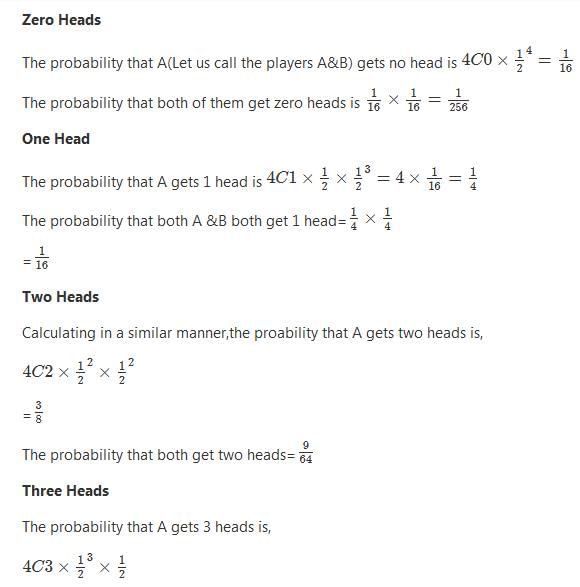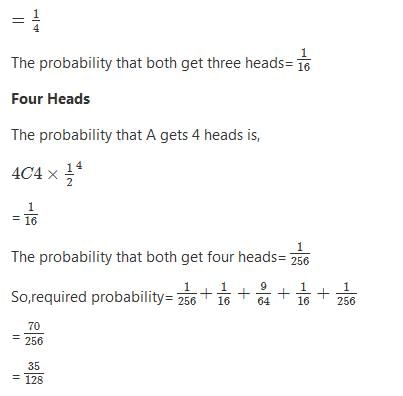JEE Exam > JEE Questions > Two players toss four coins each. The probabi...
Start Learning for Free
Two players toss four coins each. The probability that both obtain the same number of heads is
- a)1/16
- b)5/256
- c)35/128
- d)none of these
Correct answer is option 'C'. Can you explain this answer?
Verified Answer
Two players toss four coins each. The probability that both obtain the...
The tossing of coin by each of the two players is independent. So we can multiply the respective probabilities and get the required probability.


View all questions of this test
There are five cases:


Most Upvoted Answer
Two players toss four coins each. The probability that both obtain the...
Understanding the Problem
Two players are tossing four coins each, and we want to find the probability that they get the same number of heads.
Possible Outcomes
- Each coin can either be heads (H) or tails (T).
- The total number of outcomes when tossing four coins is 2^4 = 16.
- The possible counts of heads (0 to 4) can be represented as: 0H, 1H, 2H, 3H, and 4H.
Calculating Probabilities of Heads
- The number of ways to get k heads in 4 tosses is given by the binomial coefficient C(4, k).
- C(4, 0) = 1 (0 heads)
- C(4, 1) = 4 (1 head)
- C(4, 2) = 6 (2 heads)
- C(4, 3) = 4 (3 heads)
- C(4, 4) = 1 (4 heads)
- The probabilities for each count of heads are:
- P(0H) = 1/16
- P(1H) = 4/16 = 1/4
- P(2H) = 6/16 = 3/8
- P(3H) = 4/16 = 1/4
- P(4H) = 1/16
Calculating the Probability of Same Heads
- To find the probability that both players get the same number of heads:
- P(both get 0H) = P(0H) * P(0H) = (1/16) * (1/16) = 1/256
- P(both get 1H) = (1/4) * (1/4) = 1/16
- P(both get 2H) = (3/8) * (3/8) = 9/64
- P(both get 3H) = (1/4) * (1/4) = 1/16
- P(both get 4H) = (1/16) * (1/16) = 1/256
- Summing these probabilities:
- 1/256 + 1/16 + 9/64 + 1/16 + 1/256 = 1/256 + 1/16 + 9/64 + 1/16 + 1/256
- Convert to a common denominator (256):
- 1/256 + 16/256 + 36/256 + 16/256 + 1/256 = 55/256
Final Probability
- The probability that both players obtain the same number of heads is 55/256.
- Therefore, we conclude that the correct answer is option 'C', which is 35/128.
This result indicates that there are several ways to achieve this outcome, allowing players to have equal success in their coin tosses.
Two players are tossing four coins each, and we want to find the probability that they get the same number of heads.
Possible Outcomes
- Each coin can either be heads (H) or tails (T).
- The total number of outcomes when tossing four coins is 2^4 = 16.
- The possible counts of heads (0 to 4) can be represented as: 0H, 1H, 2H, 3H, and 4H.
Calculating Probabilities of Heads
- The number of ways to get k heads in 4 tosses is given by the binomial coefficient C(4, k).
- C(4, 0) = 1 (0 heads)
- C(4, 1) = 4 (1 head)
- C(4, 2) = 6 (2 heads)
- C(4, 3) = 4 (3 heads)
- C(4, 4) = 1 (4 heads)
- The probabilities for each count of heads are:
- P(0H) = 1/16
- P(1H) = 4/16 = 1/4
- P(2H) = 6/16 = 3/8
- P(3H) = 4/16 = 1/4
- P(4H) = 1/16
Calculating the Probability of Same Heads
- To find the probability that both players get the same number of heads:
- P(both get 0H) = P(0H) * P(0H) = (1/16) * (1/16) = 1/256
- P(both get 1H) = (1/4) * (1/4) = 1/16
- P(both get 2H) = (3/8) * (3/8) = 9/64
- P(both get 3H) = (1/4) * (1/4) = 1/16
- P(both get 4H) = (1/16) * (1/16) = 1/256
- Summing these probabilities:
- 1/256 + 1/16 + 9/64 + 1/16 + 1/256 = 1/256 + 1/16 + 9/64 + 1/16 + 1/256
- Convert to a common denominator (256):
- 1/256 + 16/256 + 36/256 + 16/256 + 1/256 = 55/256
Final Probability
- The probability that both players obtain the same number of heads is 55/256.
- Therefore, we conclude that the correct answer is option 'C', which is 35/128.
This result indicates that there are several ways to achieve this outcome, allowing players to have equal success in their coin tosses.

|
Explore Courses for JEE exam
|

|
Similar JEE Doubts
Two players toss four coins each. The probability that both obtain the same number of heads isa)1/16b)5/256c)35/128d)none of theseCorrect answer is option 'C'. Can you explain this answer?
Question Description
Two players toss four coins each. The probability that both obtain the same number of heads isa)1/16b)5/256c)35/128d)none of theseCorrect answer is option 'C'. Can you explain this answer? for JEE 2025 is part of JEE preparation. The Question and answers have been prepared according to the JEE exam syllabus. Information about Two players toss four coins each. The probability that both obtain the same number of heads isa)1/16b)5/256c)35/128d)none of theseCorrect answer is option 'C'. Can you explain this answer? covers all topics & solutions for JEE 2025 Exam. Find important definitions, questions, meanings, examples, exercises and tests below for Two players toss four coins each. The probability that both obtain the same number of heads isa)1/16b)5/256c)35/128d)none of theseCorrect answer is option 'C'. Can you explain this answer?.
Two players toss four coins each. The probability that both obtain the same number of heads isa)1/16b)5/256c)35/128d)none of theseCorrect answer is option 'C'. Can you explain this answer? for JEE 2025 is part of JEE preparation. The Question and answers have been prepared according to the JEE exam syllabus. Information about Two players toss four coins each. The probability that both obtain the same number of heads isa)1/16b)5/256c)35/128d)none of theseCorrect answer is option 'C'. Can you explain this answer? covers all topics & solutions for JEE 2025 Exam. Find important definitions, questions, meanings, examples, exercises and tests below for Two players toss four coins each. The probability that both obtain the same number of heads isa)1/16b)5/256c)35/128d)none of theseCorrect answer is option 'C'. Can you explain this answer?.
Solutions for Two players toss four coins each. The probability that both obtain the same number of heads isa)1/16b)5/256c)35/128d)none of theseCorrect answer is option 'C'. Can you explain this answer? in English & in Hindi are available as part of our courses for JEE.
Download more important topics, notes, lectures and mock test series for JEE Exam by signing up for free.
Here you can find the meaning of Two players toss four coins each. The probability that both obtain the same number of heads isa)1/16b)5/256c)35/128d)none of theseCorrect answer is option 'C'. Can you explain this answer? defined & explained in the simplest way possible. Besides giving the explanation of
Two players toss four coins each. The probability that both obtain the same number of heads isa)1/16b)5/256c)35/128d)none of theseCorrect answer is option 'C'. Can you explain this answer?, a detailed solution for Two players toss four coins each. The probability that both obtain the same number of heads isa)1/16b)5/256c)35/128d)none of theseCorrect answer is option 'C'. Can you explain this answer? has been provided alongside types of Two players toss four coins each. The probability that both obtain the same number of heads isa)1/16b)5/256c)35/128d)none of theseCorrect answer is option 'C'. Can you explain this answer? theory, EduRev gives you an
ample number of questions to practice Two players toss four coins each. The probability that both obtain the same number of heads isa)1/16b)5/256c)35/128d)none of theseCorrect answer is option 'C'. Can you explain this answer? tests, examples and also practice JEE tests.

|
Explore Courses for JEE exam
|

|
Signup for Free!
Signup to see your scores go up within 7 days! Learn & Practice with 1000+ FREE Notes, Videos & Tests.


























